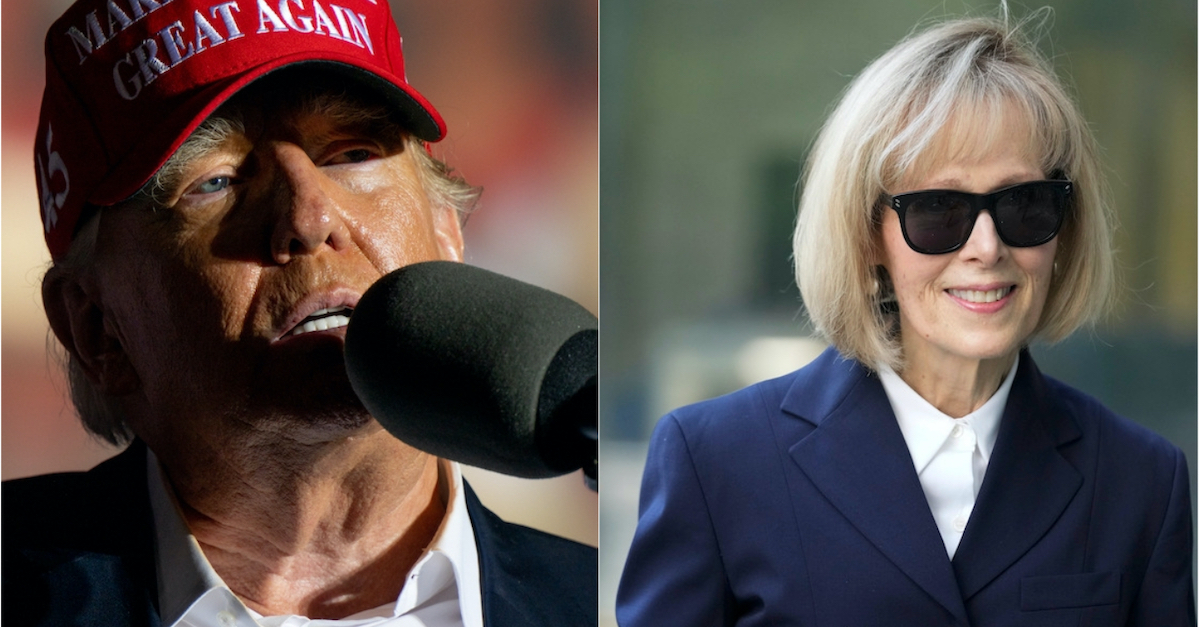
Donald Trump and E Jean Carroll (L-R: Trump via Brandon Bell/Getty Images; AP Photo/Seth Wenig)
The New York writer who successfully sued Donald Trump for sexual abuse and defamation says that his latest claim — that it was he, in fact, who was defamed by the victim of his assault — should be dismissed.
In June, just weeks after a unanimous jury awarded $5 million to writer E. Jean Carroll, Trump countersued, alleging that Carroll’s continued insistence that he raped her in a Bergdorf Goodman dressing room in the 1990s amounted to defamation. He specifically pointed to a statement she made in a May 10 interview on CNN in which, when asked about the jury’s finding that he didn’t rape her, she said: “Oh yes he did,” Carroll said. “Oh yes, he did.”
On Tuesday, Carroll, through her attorney Roberta Kaplan, filed a motion to dismiss.
Her motion describes Trump’s defamation allegation as something akin to satire:
Trump’s “tit for tat” counterclaim is nothing more than his latest effort to spin his loss at trial. Trump alleges that Carroll defamed him and caused him “inordinate” harm by implying in a post-trial interview that when he sexually assaulted her, he not only used his fingers, but also his penis. While that might read like an article penned by Andy Borowitz in the New Yorker or by a writer at the Onion, it’s actually the theory of the counterclaim that Trump now purports to assert in this action. But here in federal court, where logic and reason rather than satire prevail, it is clear that Trump’s new counterclaim for defamation should be dismissed with prejudice.
Carroll’s motion provides additional key context to Carroll’s “yes he did” comment, explaining that she was telling the CNN interviewer what she was thinking at the time the jury made its finding to the contrary.
A reporter, the filing says, asked Carroll to “talk about what you were thinking as the jury’s decisions were read off in your mind.” A transcript of that portion of the interview followed:
Reporter: What about when that first finding was found? This jury found that Trump did not rape you. What about that moment?
Carroll: [Attorney Roberta Kaplan] can explain the legal.
Reporter: Sure. And I want you to, but I just wonder, E. Jean, what went through your head when you heard that?
Carroll: Well, I just immediately say in my own head, oh, yes, he did — oh, yes, he did. So that’s my response.
Read Related Also: Amira Moghnieh went to Bexley to collect her kids. They were gone, and hours later she was dead
According to Carroll’s motion, Trump doesn’t allege a key component of defamation: that the statements Carroll made were false.
“Trump does not allege that Carroll lied about her own recollections,” the motion says. “In other words, he does not claim that she lied when she told CNN’s reporters that she had thought ‘oh, yes, he did—oh, yes, he did’ while listening to the jury verdict. Nor does Trump claim that Carroll falsely told the CNN reporters that the jury found Trump liable for rape. Instead, Trump alleges that by reciting her own undisputed internal thoughts, Carroll falsely implied that Trump had raped her.”
The motion also argues that Trump didn’t offer any facts to support his claim that Carroll was speaking with “actual malice,” and that in fact, she didn’t have the requisite state of mind to support a defamation claim.
“Trump offers no allegations about Carroll’s own thought process when she made the allegedly defamatory statement,” the filing says. “Nor does he offer any allegations meant to support an inferential finding of actual malice. Instead, the facts he pleads, and the facts incorporated by reference into his pleading, render it implausible to conclude that Carroll acted with actual malice […] Trump does not allege that she lied or misrepresented her own recollection.”
Also Tuesday, the Justice Department issued a letter clarifying its position on whether Trump is entitled to immunity under the federal Westfall Act because he was president when he made the comments that were the subject of Carroll’s first defamation lawsuit.
“[T]he Department has determined that it lacks adequate evidence to conclude that the former President was sufficiently actuated by a purpose to serve the United States Government to support a determination that he was acting within the scope of his employment when he denied sexually assaulting Ms. Carroll and made the other statements regarding Ms. Carroll that she has challenged in this action,” the DOJ’s letter says. “The evidence of Mr. Trump’s state of mind, some of which has come to light only after the Department last made a certification decision, does not establish that he made the statements at issue with a ‘more than insignificant’ purpose to serve the United States Government.”
As Law&Crime previously reported, the Justice Department was undecided on whether to support Trump in the matter.
Read Carroll’s motion, below.
Adam Klasfeld contributed to this report.
Have a tip we should know? [email protected]








